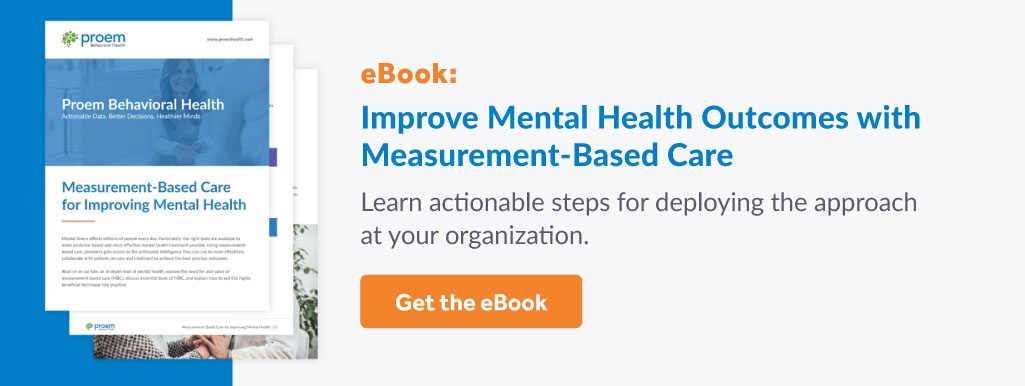Healthcare providers routinely use measurement to determine physical health, but according to Psychiatry Online, only 11% of psychologists and 18% of psychiatrists apply a rating system during their routine mental healthcare practice. In mental health and substance disorder care, about 95% of measures used to assess quality in health plans, or that become the basis for reimbursement incentives, are all process measures. However, despite its infrequent use, measurement-based care (MBC) is a proven, powerful tool for improving treatment outcomes. This explains why it's used by the nation's largest integrated healthcare system: the Veterans Health Administration, a component of the United States Department of Veterans Affairs (VA).

Before we discuss how MBC works within the VA, let's take a step back and gain a better understanding of measurement-based care.
What Is Measurement-Based Care?
In a blog post, Dr. Tom Young, a board-certified family physician, and the chief medical officer and founder of Proem Health, provides the following measurement-based care definition: "Measurement-based care is, in its simplest form, measuring an outcome secondary to an intervention. That intervention could be in a physical health realm, such as a surgical procedure or prescribed medication. It could also be any number of interventions in the world of behavioral health, such as transcranial magnetic stimulation, medication, or therapy. Whatever the intervention is, MBC is designed to look at the outcome." (Measurement-Based Care is the process required to remove unwarranted variation from diagnosis and treatment.)
Another way of looking at it: measurement-based care evaluates a patient's signs and symptoms before, during, and after treatment to enhance behavioral health outcomes. Clinical care is based on measurements such as lab results, vital signs, and self-reported patient data, and the measurement-based care approach is considered a critical component in several evidence-based practices and frameworks usually added to any treatment.
Clinicians tend to use a step-by-step approach for assessing and treating symptoms and reviewing outcomes, and then adjust their care approach when patients are unresponsive to the treatment. Despite wide acceptance of this approach and understanding of the benefits of measurement-based care, use in behavioral health is less common. If more widely used, numerical frameworks could support mental health treatment plans and evidence-based practices.
Data collection regularly provides insight into the patient's progress and helps keep the focus on current targets through the following ways:
- Symptom rating scales: Clinicians can employ quantitative measures to obtain a precise picture of an individual patient's needs. Symptom rating scales streamline the assessment process and help in making differential diagnoses. Both therapist and patient can participate in using rating scales. Unlike clinician-rated scales, patient-rated scales are less time-consuming and provide essential insights into the patient's experience.
- Collaboration and value-based care: There's an increasing demand by payers for accurate assessments and outcome measures in the current healthcare environment. With the advent of value-based care, Medicare, Medicaid, and a growing number of commercial payers, are increasingly requiring objective documentation of improvement. Measurement-based care provides empirical evidence of clinical outcomes for value-based care.
Finally, screening and monitoring over time support an integrated care model. Tracking outcomes based on measurement-based care tools such as rating scales offer an objective look into the patient’s health. Quantitative measures are easily accessible for collaborating providers as they supplement the documentation to give the entire care team a clearer picture.
Why Is Measurement-Based Care Important?
Among the benefits of measurement-based care is that data collected from questionnaires can signal when a treatment is not working or not working as effectively as desired and help reduce unwarranted variation in care. If providers intend to address a lack of progress in treatment or reduction in previous treatment gains, measurement-based care informs discussions in progress and the changes needed during a patient’s individual treatment.
In addition, measurement-based care can direct practitioners to recognize important treatment targets and better facilitate care coordination or collaboration between practitioners and the treatment team.
Measurement-based care also provides important empirical evidence of clinical outcomes. Tracking outcomes based on rating scales offers an objective look into the patient's mental health that can be viewed comparatively over time and in the research setting. For a literature review of theoretical and empirical support for measurement-based care, you can read "A Tipping Point for Measurement-Based Care."
Measurement-Based Care at the VA
Now let's take a closer look at MBC and the VA. As we previously noted, one area where measurement-based care is impacting mental health outcomes within the VA. The VA is rolling out measurement-based care principles to establish a standard of behavioral health in treatment planning and in setting recovery goals. Measurement-based care for behavioral health at the VA uses a “collect, use, share” foundation. This is how it works:
- Collect: Veterans complete reliable, validated, clinically appropriate questionnaires at regular intervals.
- Use: Clinicians review the results with veterans to make decisions about care.
- Share: Clinical information is shared with the veteran and other clinicians involved in the veteran’s care to facilitate results-driven, personalized treatment.
When the VA was initiating its MBC in mental health initiative several years ago, an interagency task force on military and veterans agreed to four measures for an initial pilot of the measurement-based care program. They were as follows:
- PTSD Symptom Checklist (PCL-5) for assessment of PTSD
- Brief Addiction Monitor (BAM-R) for assessment of substance use and risk and recovery factors
- Patient Health Questionnaire (PHQ-9) for assessment of depression
- Generalized Anxiety Disorder (GAD 7) for assessment of anxiety
A survey of 230 mental health providers across nearly 50 VA medical centers was conducted two years after the pilot to assess attitudes and self-reported use of various components of measurement-based care. Adoption of the measurement-based care tools at the VA was high. More than half of the providers (58%) reported collecting at least one measure for at least half of their patients. And attitudes about the utility of such care were positive. Acceptance into treatment planning was high, with 72% indicating that they usually or always explained the results to patients and 65% indicating that they used the results as part of shared decision making. However, only 37% indicated that they used the scores when discussing a patient with another provider.
As authors of the VA pilot program study note, measurement-based care using patient-reported data was shown to improve treatment outcomes for patients with mental illness, from better engagement to faster response to treatment. Yet despite these benefits of measurement-based care and availability of validated measures for use specifically by mental health practitioners, the approach has been adopted to a lesser degree than in other clinical areas. As the VA acknowledges, adoption of measurement-based care is lower in mental healthcare because it is a “pretty big adjustment” in clinical practice. As a result, the VA is rolling out measurement-based care in phases to learn the best ways to put it into practice.
What Are Measures of Mental Health to Consider?
If your organization is looking more closely at developing a measurement-based care behavioral health program, you might be wondering what mental health measures you should consider including in the program to help ensure you can make better-informed decisions and improve outcomes. The good news is that Proem has already done the heavy lifting for you. Its solutions support measurement-based care for behavioral health, enabling healthcare providers to electronically screen, interview, monitor, and measure outcomes for the 17 most diagnosed adult DSM-5 mental health disorders, the 24 most diagnosed pediatric disorders, and other related mental health disorders.
Throughout the entire mental healthcare process, Proem solutions gather the necessary data for MBC. Proem fully documents the data collected in each patient's journey to validate the outcome for providers, healthcare systems, and payers. Learn more about how Proem can support your organization by contacting them today.





.png)









